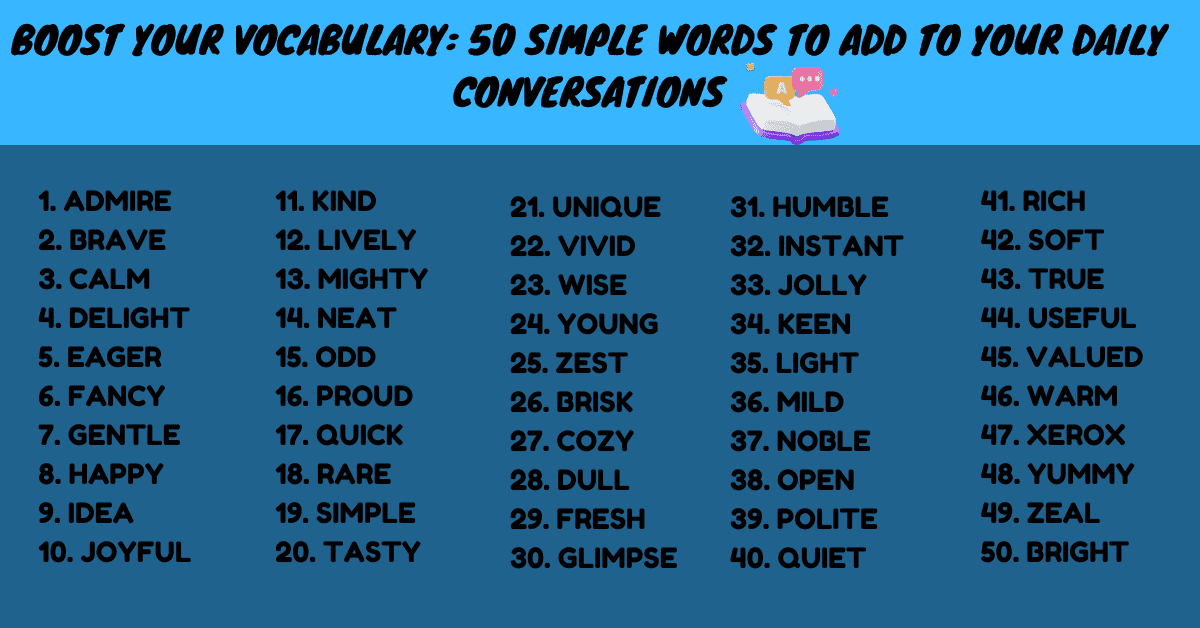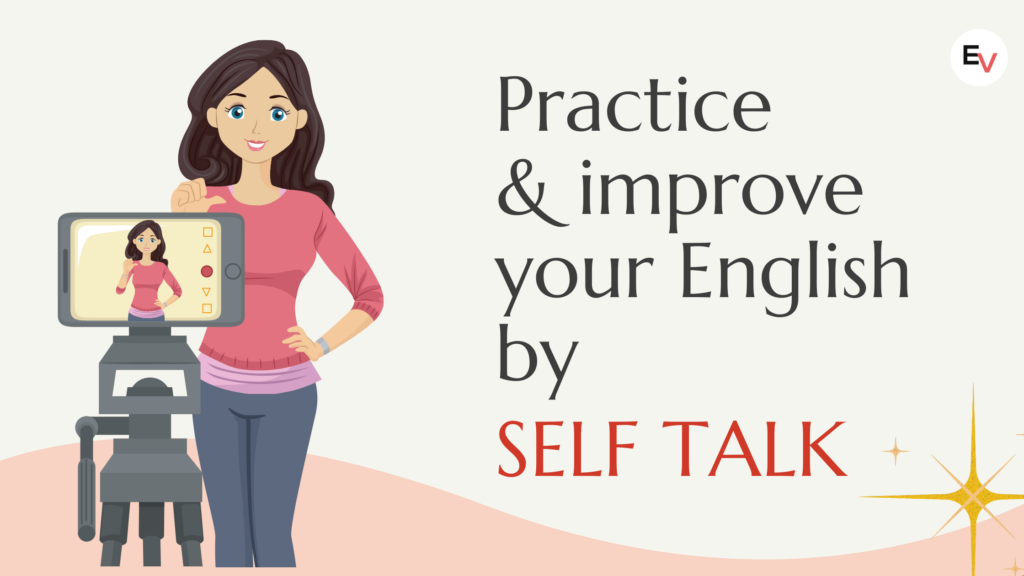Expanding your vocabulary doesn’t have to be daunting. Simple words can make a big impact on your ability to communicate clearly and effectively. Here are 50 simple words to enhance your daily conversations, along with tips on how to use them.
Why Expanding Your Vocabulary Matters
Expanding your vocabulary:
- Improves communication: Simple, clear words help convey your thoughts more accurately.
- Enhances understanding: A broader vocabulary aids in comprehending texts and conversations.
- Boosts confidence: Knowing the right words can make you more confident in speaking and writing.
How to Incorporate New Words
- Read Regularly: Books, articles, and blogs expose you to new words in context.
- Use a Dictionary: Look up unfamiliar words and learn their meanings.
- Practice Writing: Incorporate new words into your writing to reinforce learning.
- Engage in Conversations: Use new words in your daily interactions to make them part of your active vocabulary.
50 Simple Words to Enhance Your Daily Conversations
- Admire (verb) – To look up to someone.
- Example: “I admire her dedication to her work.”
- Brave (adj.) – Showing courage.
- Example: “He is a brave firefighter.”
- Calm (adj.) – Free from stress or worry.
- Example: “She remained calm during the emergency.”
- Delight (noun) – A feeling of great pleasure.
- Example: “The children’s laughter was a delight.”
- Eager (adj.) – Very interested and excited.
- Example: “She was eager to start her new job.”
- Fancy (adj.) – Elaborate or decorative.
- Example: “He wore a fancy suit to the party.”
- Gentle (adj.) – Kind and soft.
- Example: “He gave the baby a gentle hug.”
- Happy (adj.) – Feeling or showing pleasure.
- Example: “She was happy with her gift.”
- Idea (noun) – A thought or suggestion.
- Example: “He had a great idea for a new project.”
- Joyful (adj.) – Full of joy.
- Example: “Their reunion was a joyful occasion.”
- Kind (adj.) – Friendly and generous.
- Example: “She is always kind to strangers.”
- Lively (adj.) – Full of life and energy.
- Example: “The concert was lively and fun.”
- Mighty (adj.) – Strong and powerful.
- Example: “The mighty lion roared loudly.”
- Neat (adj.) – Tidy and organized.
- Example: “His desk was always neat.”
- Odd (adj.) – Strange or unusual.
- Example: “He had an odd habit of talking to himself.”
- Proud (adj.) – Feeling pleased and satisfied.
- Example: “She was proud of her achievements.”
- Quick (adj.) – Fast in movement or action.
- Example: “She gave a quick response.”
- Rare (adj.) – Not common or frequent.
- Example: “It is rare to see such kindness.”
- Simple (adj.) – Easy to understand or do.
- Example: “The instructions were simple to follow.”
- Tasty (adj.) – Having a pleasant flavor.
- Example: “The cake was very tasty.”
- Unique (adj.) – Being the only one of its kind.
- Example: “Each person’s fingerprint is unique.”
- Vivid (adj.) – Bright and clear.
- Example: “She has vivid memories of her childhood.”
- Wise (adj.) – Showing good judgment.
- Example: “His advice was very wise.”
- Young (adj.) – Having lived for a short time.
- Example: “The young girl loves to play.”
- Zest (noun) – Great enthusiasm and energy.
- Example: “She approached life with zest.”
- Brisk (adj.) – Quick and energetic.
- Example: “They took a brisk walk in the park.”
- Cozy (adj.) – Comfortable and warm.
- Example: “The cabin was cozy and inviting.”
- Dull (adj.) – Lacking interest or excitement.
- Example: “The lecture was dull and boring.”
- Fresh (adj.) – New and clean.
- Example: “She loves the fresh smell of rain.”
- Glimpse (noun) – A quick look.
- Example: “She caught a glimpse of the sunset.”
- Humble (adj.) – Not proud or arrogant.
- Example: “He remained humble despite his success.”
- Instant (adj.) – Happening immediately.
- Example: “She felt an instant connection with him.”
- Jolly (adj.) – Happy and cheerful.
- Example: “He is always in a jolly mood.”
- Keen (adj.) – Eager or enthusiastic.
- Example: “She is keen to learn new skills.”
- Light (adj.) – Not heavy or intense.
- Example: “The dress was made of light fabric.”
- Mild (adj.) – Gentle and not extreme.
- Example: “The weather was mild and pleasant.”
- Noble (adj.) – Having high moral qualities.
- Example: “He is a noble and honorable man.”
- Open (adj.) – Honest and willing to share.
- Example: “She was open about her feelings.”
- Polite (adj.) – Showing good manners.
- Example: “He was polite and respectful.”
- Quiet (adj.) – Making little or no noise.
- Example: “The library was quiet and peaceful.”
- Rich (adj.) – Having a lot of wealth or resources.
- Example: “The soil was rich and fertile.”
- Soft (adj.) – Gentle to touch.
- Example: “The blanket was soft and warm.”
- True (adj.) – In accordance with fact.
- Example: “Her story was true and accurate.”
- Useful (adj.) – Helpful and practical.
- Example: “The guidebook was very useful.”
- Valued (adj.) – Highly regarded.
- Example: “He was a valued member of the team.”
- Warm (adj.) – Having a moderate heat.
- Example: “The soup was warm and comforting.”
- Xerox (noun) – A copy made by a photocopier.
- Example: “Please make a xerox of this document.”
- Yummy (adj.) – Tasty and delicious.
- Example: “The cookies were yummy.”
- Zeal (noun) – Great energy in pursuit of a cause.
- Example: “She worked with great zeal.”
- Bright (adj.) – Full of light or color.
- Example: “The future looks bright.”
Learn These Words Easily with EngVarta
Enhancing your vocabulary is a breeze with EngVarta. Our app provides an immersive learning experience that helps you practice and master new words daily. With live practice sessions and personalized feedback from expert language trainers, you’ll be able to use these words confidently in your conversations. EngVarta’s interactive platform ensures that learning is engaging and effective, making it easier to integrate new vocabulary into your everyday speech. Download the EngVarta App today to start your journey with EngVarta today and watch your English skills soar! Get free English lessons from our YouTube channel.
Conclusion
Building your vocabulary with simple, everyday words can significantly enhance your ability to communicate and understand others. Start using these words today, and watch your conversations become more engaging and effective. Happy learning!



